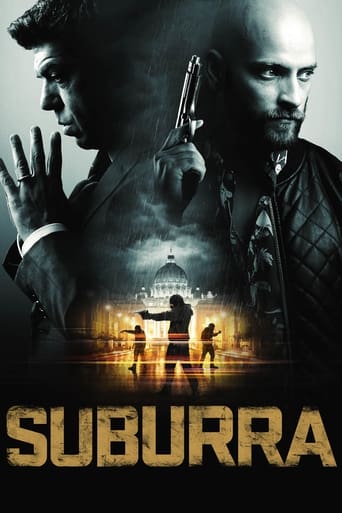Titreenp
SERIOUSLY. This is what the crap Hollywood still puts out?
Myron Clemons
A film of deceptively outspoken contemporary relevance, this is cinema at its most alert, alarming and alive.
Payno
I think this is a new genre that they're all sort of working their way through it and haven't got all the kinks worked out yet but it's a genre that works for me.
The Couchpotatoes
I never watched a lot of Italian movies but this one I will certainly watch again in the future. If you like crime stories then Subbura is for you. It has everything you can ask for. Corrupt politicians, different mafia families, bloody violent scenes, drugs and sex, religious scumbags, scandals and so on. The actors are all excellent and play their roles with much conviction. If you didn't knew they were actors you would really believe they are all mob related. The darkness drips of this movie. One of the better Italian film noir I've seen in a long time. If Stefano Sollima is planning on making more of those movies I'm going to be a fan. It's a long movie but with all the twists, violent scenes and great discussions you will never get bored.
Radu_A
I'm only writing this review because I'm rather surprised that nobody commented on the blatant racism in this film so far. On the one hand, "Suburra" is a very well timed and written thriller with an intricate web of intertwined characters. On the other hand, the most memorable of these is a Gypsy mafia don whose family is portrayed in a stereotypical and racist way.To be sure, all characters in this dark tale of twisted conflicts in the Roman underworld are stereotypes in some way: We have a corrupt politician who runs into trouble with the aforementioned gypsy don; a hooker who is part of the same trouble; her party-organizing pimp who is being pushed to the brink by the don because of her; a local young crime boss involved into the whole mess by his junkie girlfriend; and a usually invisible mafia spin doctor who tries to contain the situation. Yet all of these pale in comparison with the utterly ruthless gypsy Anacleti Manfredi, because all of the others retain some sort of humanity through their weaknesses.Anacleti, on the other hand, is portrayed as an animal rather than a human. No cliché is spared: his house is teeming with relatives to insinuate that gypsies fornicate like rabbits; children run around howling in his luxurious villa to indicate how uncivilized gypsies are; the use of Romani is limited to guttural screaming to show that it is a subhuman means of communication; all Gypsies in the film respond to any challenge violently, in the most provocative fashion imaginable; and the only living thing Anacleti can relate to is his pitbull, because gypsies are animals, you see. Well, there is an ironic twist to that in the end.And yet the other reviewers here display a remarkable lack of indignation. If this was an American film and that protagonist was black, many people would find this kind of exploitation unbearable. But sadly, Gypsies continue to be just about the only social group you can still deliberately defame. One review even mentions that this characterization was believable. Fact check: no, in the past ten years there was no shoot-out in a Roman supermarket instigated by gypsy thugs.I find this rather typical of Italian cinema of late. Many people love films like this or "Youth" or "Le Meraviglie" or "Tale of Tales" because they break with the neo-realism that has haunted European cinema for so long that it has become an empty, repetitive shell. But in these films, characters remain strangely shallow, either lifeless or stereotypes, because they rely on style and cinematography - to be sure, the latter is excellent in "Suburra". Fortunately, there are still films which focus on story and character development, like "Smetto quando voglio" and "E stato il figlio".
livetdv
Italian neorealism is alive, different than De Sica's or Visconti's neorealism, what we have here is a new, direct and probably more "hollywood oriented" kind of neorealism.Living myself in Rome I see these characters every day: The corrupted politician, the violent gypsy family, the rich, fashion and selfish pimp, the right wing former terrorist now working with the mafia from the south, what we would here call "coatto" (Number 8) the uneducated and violent kid who run his territory and who's been involved in the "waterfront" project just because it is "his" territory....the Vatican and all it's power....all you can see in this movie, all those characters are real, not that you meet them walking on the streets of Rome, but you know they're there and it's sad to say but there's nothing you can do to stop them, you can only watch this movie and think for a moment it is just a movie, it is not real.
eryui
In a frame that follows the events of 2011, the fall of the government and the resignation of the pope, the film plunges us into the panorama of the capital, Rome, in an intertwining of political, church and the underworld by dynamic rather bloody and equally plausible.The director already well-proved by some successful productions like the unmissable "Romanzo Criminale, The Series", the amazing "Gomorra, The Series" and "ACAB", focuses once again on target with a well-made and quite compelling thriller. A crime story, a veiled complaint, that shows how the underworld branches off the power by means of politics and corruption.7+/10

